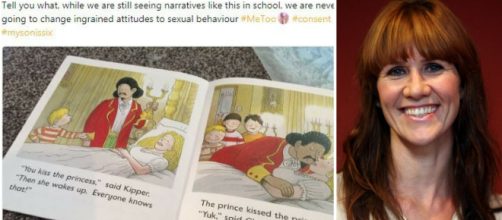One mum has sparked a heated debate with her suggestions of banning the old age fairy tale of Sleeping Beauty from her six-year-old son’s school curriculum.
It came after her son brought the story home from school, and upon reading it together the mother felt it was portraying an inappropriate message.
The issue of consent.
The most common version of the story is that the Sleeping Beauty is put under a curse by a witch, and sleeps for a hundred years. The Prince wakes her from the curse by kissing her. However, as Sleeping Beauty was unconscious when the Prince kissed her the mum from Tyneside says that it brings up the question of consent, as the Princess did not actually consent to the Prince kissing her.
Sarah has said the book should not be removed permanently from the curriculum but instead used as a platform to raise the issue of consent with older children.
The concerned mother took to Twitter and asked if the story was still relevant, and shared it using the #MeToo hashtag which has become synonymous with victims standing up against sexual abuse in wake of the Harvey Weinstein scandal.
It seems as though the sexual harassment controversy has now found its way into schools and children’s literature, however, is this a step in the right direction, or a step too far?
The tweet attracted a lot of attention, with some in agreement and some declaring it was ridiculous to suggest the classic fairy tale was anything other than an innocent children’s story.
Janet Street-Porter, known for her opinionated views has penned an article for The Independent and said she may have a point. She goes on to say that children need to learn boundaries and when to trust strangers. How would you feel being woken up by a stranger kissing you, she questions?
Fiction versus reality.
Others, however, have been quick to defend the popular story by saying that it will not promote boys to kiss girls without their consent. The online website Spiked has declared both Sarah and Janet’s arguments as ridiculous if parents cannot explain the difference between fiction and real life to their children.
It is true that the origin of a lot of fairy tales and nursery rhymes to come from some less desirable sources, but in 2017, they are still being read to our children without making them into over sexualised individuals.
A children’s fairy tale in a dream world where witches and curses exist and Princesses dreams of marrying their Princes with a true love’s kiss is now being labelled as inappropriate rather than imaginative fun.
Could the recent sexual harassment controversy signal the end of childhood innocence?
Will classic fairy tales be banned in schools? That the next generation of children will instead use them to learn about sexual behaviour?
This has also come at the time that over the holidays some organisations are calling for parents not to force children into giving their relatives a hug or a kiss goodbye.
A lot of websites including PopSugar and The Huffington Post have all featured the subject of forced affection, and how this teaches young children the wrong idea about boundaries, and consent when you ask them to give Grandma a kiss.
Affection and how we show love should be because we want to not because we are pressured by our parents to do so they advertise.
Whether Sarah Hall’s request to have Sleeping Beauty removed from younger children’s curriculum is granted is yet to be seen.


